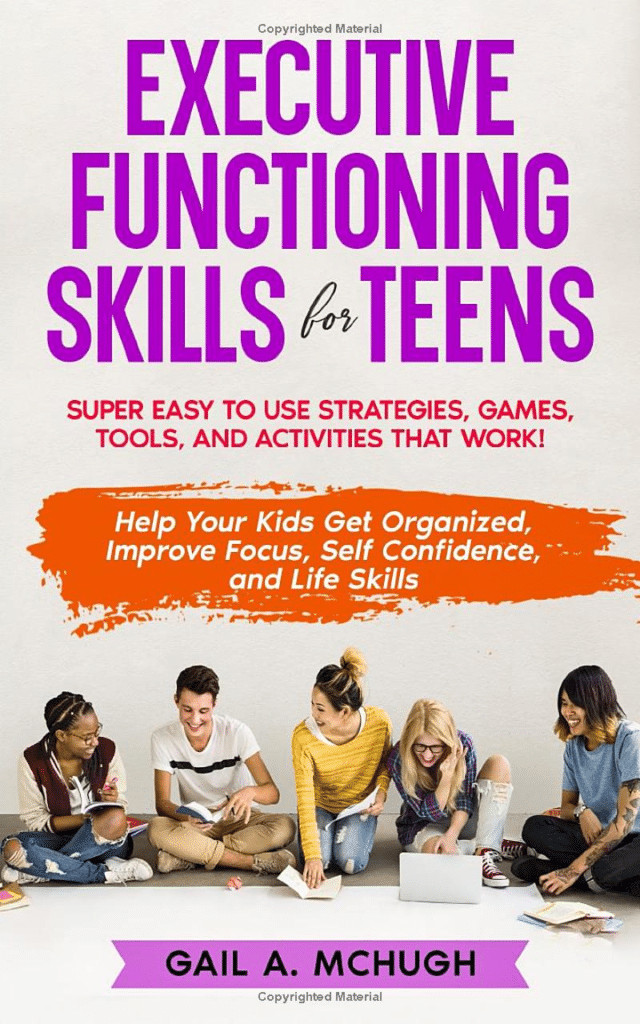This is the third in our series looking at executive functioning in teens. You may also want to read What Are Executive Function Skills and Why Do Teens Struggle With Them? and 10 Simple Ways Parents Can Help Their Teens with Executive Function Skills

Today’s classrooms look much different from when we were kids. Thanks to an increased awareness of learning differences, students of all abilities sit alongside each other.
Many of these differences didn’t have a name when we were kids, and often these struggling students were labeled as lazy, disruptive, and forgetful. They were scolded and sent to the principal for acting out or were punished for being tardy and disorganized. Parents would think their student wasn’t trying hard enough, and other kids would think they couldn’t keep up with the work.
We now understand that many of these students had hidden disabilities and could have benefitted from interventions, including support for underdeveloped executive function skills.
These mental skills, which most of us have honed to the point that we are unaware we are using them, can be particularly challenging for teens inhabiting adult-like bodies with still-maturing brains.
As parents, we must learn what these skills are and when we should worry that our teens need additional support.
Related: 9 Essential Soft Skills Every Teen Needs to Succeed in Today’s World
Signs Your Teen Is Struggling with Executive Function Skills
Some level of executive function deficit is to be expected during the teen years. Hormonal changes and rapid teen brain development cause mood swings and encourage risk-taking behavior.
Someone who struggles with executive functioning will likely have trouble starting or finishing tasks, executing multiple steps of a project in sequence, and keeping their belongings organized. They may also appear scatterbrained, lose things frequently, and have difficulty tracking time.
These are challenges for most teens, so it can be tough to discern when it is normal teen behavior and when you may need intervention to help your child.
As we mentioned, it’s normal for teens to struggle with these skills, but there are signs when it may indicate a larger problem:
Your teen struggles more than his or her peers
Teachers may report they don’t pay attention in class or come to class unprepared. These students may routinely work slower than others and regularly have incomplete assignments.
Grades don’t reflect abilities
Their executive function skills are out of sync with their cognitive development. For example, they may have high cognitive values, yet low processing speed. This is common among kids who have been identified as being gifted learners. Or, they may do the homework but forget to turn it in or can’t keep track of their assignments.
Uncharacteristic outbursts
Teens who are struggling with executive function skills are aware that they are struggling and may be frustrated that they don’t know why. They also may be embarrassed that their peers aren’t having the same problems. This may lead to emotional outbursts or even physical aggression.
Reduced interest in favored activities
Sometimes, interests change. Other times, subtle increases in demands cause struggles that seem insurmountable. Teens in leadership positions that require strong organizational or time management skills may flounder, even if they are dedicated or interested in the topic. Instead of asking for help, they may say it’s not fun anymore or that they just aren’t interested.
Decoding the labels of executive function deficit
Adults may be frustrated when teens don’t meet expectations, and even those who know better sometimes fall back on old habits and engage in non-constructive labeling. In a webinar for parents, Peg Dawson, psychologist and author of numerous books on executive skills, including Smart but Scattered and Smart but Scattered Teens, points out that certain labels may directly correlate with a particular executive function skill.
For example:
Teens who are called lazy may be struggling with task initiation.
Teens referred to as unmotivated may be struggling with sustained attention.
Teens who are called disruptive may be struggling with emotional control.
Teens labeled oppositional may be struggling with flexible thinking skills.
Teens called messy may simply lack organizational skills.
Teens referred to as absent-minded may have struggles with working memory.
Teens who are reported to not be working to their potential may be struggling with response inhibition.
Teens who supposedly lack a work ethic may need help developing goal-directed persistence.
When there’s a larger problem: Executive Dysfunction in teens
According to the Cleveland Clinic: Executive dysfunction is a symptom that happens with conditions that disrupt your brain’s ability to control thoughts, emotions, and behavior. It’s most common with certain mental health conditions, especially addictions, behavioral disorders (ADHD), neurodevelopmental disorders (ASD), and mood disorders (depression, bipolar, etc.). It may be treatable with medications, psychotherapy, or both, depending on why it happens.
If you suspect your teen has more than an average struggle with executive function skills, a learning disability such as ADD, dyslexia, or Autism may be the root cause. Your school counselor can provide preliminary testing, or you can ask your child’s doctor. A neuropsychological evaluation may be recommended.
Depending on the results, your teen may be eligible for an Individualized Education Program (IEP), a legally-binding document that lays out any accommodations needed to facilitate a student’s success, which may include additional resources to support your student. While executive dysfunction in teens is not yet identified in the Diagnostic and Statistical Manual of Mental Health Disorders, many schools will recognize and support executive function-related issues.
It’s also important to note that some Individuals suffering from anxiety or mood disorders may struggle with executive function skills. In some cases, executive function skills improve when the underlying cause is addressed.
If your teen is found not to have a diagnosable disability, there are professionals who can help improve their executive function skills, such as private tutors or executive function or life coaches who can help your teen understand their needs and set goals. They are trained to support and develop strategies as well as measure success.
Some apps, like CoachBit, can help your teen with organizational or other executive function skills.
The bottom line is that we need to give our teenagers a lot of grace while they develop their executive functioning skills. Parenting an adolescent is sometimes like trying to predict which direction and at what intensity the hurricane will go.
While executive function skills take decades to mature, being aware of their importance and how you can support developing them can go a long way in supporting your child throughout their life.
Looking for more information on executive dysfunction in teens?
Check out Executive Functioning Skills for Teens by Gail McHugh which provides easy to use strategies, games, tools, and activities to help your teens get organized, improve focus, gain self-confidence and acquire life skills.

Parenting teens and tweens is hard, but you don’t have to do it alone. Here are some other helpful articles:
Time Management Can Be Tricky for Teens: Here’s How to Help
How To Teach Teens To Budget And Why It Is So Important
If Your Child Is Turning 18 in High School, You Need These Legal Forms
*This post may contain affiliate posts where there is a commission earned for purchases made from links on our site.






some genuinely nice and useful information on this site, likewise I believe the design holds great features.